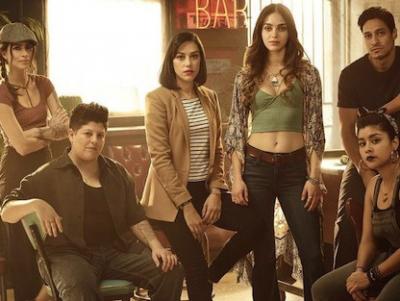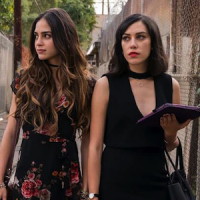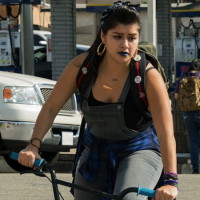STARZ VIDA: Q&A w/ Melissa Barrera, Mishel Prada, Ser Anzoategui, EP Saracho + Series Overview, More
Maj Canton - May 13, 2018

On Sunday, May 6, at 8:30 pm ET/PT, STARZ premiered VIDA. The original series, a half-hour drama created by Tanya Saracho, focuses on two Mexican-American sisters from the eastside of Los Angeles who couldn’t be more different or distanced from each other. Circumstances force them to return to their old neighborhood where they are confronted by the past and surprising truth about their mother’s identity. Starring: Melissa Barrera, Mishel Prada, Ser Anzoategui, Chelsea Rendon, Carlos Miranda, Maria Elena Laas, Ramses Jimenez, Elizabeth De Razzo, Elena Campbell-Martinez, Erika Soto, Luis Bordonada, Renee Victor, and Adelina Anthony/.
This past January at the Television Critics Association (TCA) Winter Press Tour, STARZ presented a panel that included series creator/Executive Producer Tanya Saracho and stars Melissa Barrera, Mishel Prada, Ser Anzoategui and Chelsea Rendon. Here are a few highlights (edited for clarity and readability) from that panel.

From left to right, Mishel Prada, Melissa Barrera, Tanya Saracho, Ser Anzoategui, and Chelsea Rendon
at the Television Critics Association (TCA) Winter Press Tour in January 2018.
|
|
|
Ser Anzoategui (left) in VIDA. |
Question: How did you approach making this series and working for a major network? Tanya Saracho: I used to be on LOOKING and I loved it, but I was always missing that female, brown, queer perspective. In VIDA we have a lot of that. A lot of things I wanted to deal with we get to do here so it’s really exciting. It’s very naturalistic in a half hour. The front and center is brown, queer, femaleness. It’s Latinx. It’s about this neighborhood but it’s a queer show. The whole process [of pitching to Starz] was really inclusive and I hardly ever got told, “no.” When I said I wanted an all Latinx writers’ room, done. Most of our department heads are female. All our directors are either women of color or Latinx. There’s no tokenism. I don’t have to be a cultural ambassador. Ser Anzoategui: I felt really embraced and completely included from the beginning because I’m an activist as well as many other hats I wear in the Eastside community for the past 18 years. I definitely feel that my contribution – whether it was something Eastside, queer, LGBTQ – it was all very ears and respectful. I’ve never felt so respected before. |
|
Melissa Barrera: The nice thing about it was the we could feel the love of everyone involved and the passion to tell this story and bring these characters to life and give voice to characters that are not really seen in mainstream media. This is what Tanya is doing for all of us. |
|
|
|
|
|
|
Melissa Barrera (left) and Mishel Prada (right) in VIDA. |
Question: Are you trying to be more inclusive with the show or do you just go for the people who are going to watch it and understand it on their own? Tanya Saracho: I think there’s a universality to the story of two sisters coming from a fractured family, coming home, sort of retaking their place in this neighborhood that is going to translate. If you abide by the notion that this country was made up by the children of immigrants, that’s exactly what these girls are. They’re second-generation Americans, so VIDA is very much an American show. Mishel Prada: That’s a universal story. That’s a human story and I think that sometimes when we look at, “Oh that person is queer or gay or has brown skin or black skin, that’s a niche thing,” I think we’re seeing that’s not completely true. |
|
|
|
Mishel Prada (left), Melissa Barrera (center) and Ser Anzoategui (right) in VIDA. |
Question: Was it important for you to write in a way that you’re not making apologies for who your characters are? Tanya Saracho: It was important to have an inclusive and insider point of view. This is these people front and center. That was very important because we don’t get to see a lot of that. Sometimes we get to be the best friend or the one holding a gun. Mishel Prada: This is us telling our own stories as opposed to being dictated by other people as to what our stories are. I think what’s also amazing about the sisters is that we are exploring what it’s like to be in that in-between place. Your parents are from another country, you were born here but you don’t completely feel here or there. |
|
Melissa Barrera: It is a show about a Latinx community and a Latinx family but we’re Americans. It’s a thing that’s been happening, reminding people that have a dual identity that they’re not home, that this is not their place, and I think this is a show that’s gonna be like if this feels like home, then it is home. Question: How much of your own personal experiences influence the show? Tanya Saracho: You get in there and you don’t even notice. But there’s a little bit of me in all the characters. Some of my writers have to pull me back, like when I was explaining my own queerness. I wanted to explain it like, “I’m going to explain it through Emma.” Just let Emma be Emma. So it was through my prism that I was getting to build this and not getting told, “No,” at any turn. |
|
|
|
|
Melissa Barrera (left) and Mishel Prada (right) in VIDA. |
Question: What makes the sisters so different? Melissa Barrera: You can basically say that the sisters are polar opposites because they chose two very different paths to get out of their neighborhood. Lyn chose men because, sadly, like many women when they’re only told they’re pretty and never anything else about themselves, like they’re smart or creative, she decided that was the only thing she had. She’s taking the easy way out and living off men. And that does not sit well with Emma. Mishel Prada: Emma really was sent away very young. She realized early that if she didn’t take care of herself nobody else would. She pulled herself up by her bootstraps and really made something of herself but also never really dealt with the emotional part of it. So she lived behind this really strong wall of not letting anyone get close to her because the only people that did that hurt her. |
|
Tanya Saracho: And we’re not pulling any punches. We’re trying to portray these complicated, ugly at times Latina millennials, and that’s really important because oftentimes we get to be the archetype. So to really scratch up the image of these girls is really important to us. |
|
|
|
|
Chelsea Rendon in VIDA. |
Question: As everything in the show was coming together and becoming real, how did you feel? Tanya Saracho: It’s my vida, my life. I mean, I am not graceful – you see my geekiness right now because I am excited. We don’t get to do this and I’m so excited to share this world with you guys. The fact that STARZ came to me and that they trusted me with a pen, in that regard. And then the fact that we got to build it right and the conversations were the right conversations. At every step of the way I got really excited. Chelsea Rendon: And me and Ser are actually from the Eastside, so it’s great to be from the area we’re portraying. It brings a whole other level of love and awe. Ser Anzoategui: And I truly believe that VIDA will change the cultural landscape of Los Angeles. |
|
Question: Could VIDA be set anywhere other than Los Angeles? Ser Anzoategui: All cities are facing a lot of what the Eastside is facing today, nationally and internationally. The changing neighborhood is very important. It includes a lot of different ages, a lot of different races. It’s going to translate to everybody. Tanya Saracho: And we are dealing not only with the notion of “gentrification” but of “gentefication.” “Gente” means “the people.” And gentefication is gentrification of a Latinx space by another Latina. So when you open up that can of worms of us gentrifying our own, there’s a lot of story there. |
|
|
|
SERIES OVERVIEW
VIDA is a half-hour drama series focusing on two Mexican-American sisters from the eastside of Los Angeles who couldn’t be more different or distanced from each other. Circumstances force them to return to their old neighborhood where they are confronted by the past and surprising truth about their mother’s identity.

|
|
CHARACTER DESCRIPTIONS
|
|
|||
|
LYN (Played by Melissa Barrera) |
|||
 |
Lyn is a care–free party girl who has figured out how to use her looks to live a lush life in San Francisco. With plans to start an Aztec inspired lotion line with her wealthy boyfriend, she’s living her dream. But when Lyn has to return home and face her past, she will be forced to question everything she thought she ever knew about herself. |
||
|
|
|||
|
EMMA (Played by Mishel Prada) |
|||
 |
Emma is a smart and driven woman who has worked to build a great career for herself in Chicago. Estranged from both her sister (Lyn) and her mother (Vidalia), she reluctantly returns home for her mother’s funeral and is the one who has to deal with the family business. Unbeknownst to her, things at home have changed drastically, and her sister might very well be the only person who can help her make sense of everything. |
||
|
|
|||
|
EDDY (Played by Ser Anzoategui) |
|||
 |
Eddy is a sensitive soul who is trustworthy, generous and passionate, but also intimidating upon first glance. In a way, she’s the heart of her community, which is why it’s not surprising that when her heart breaks upon the death of her wife Vidalia, the community feels it too. |
||
|
|
|||
|
MARISOL (Played by Chelsea Rendon) |
|||
 |
Marisol is the expression of east side youth culture: woke, politicized, and deep in the resistance against gentrification. She will do everything in her power to fight against any and all type of injustices, but when she realizes she’s the victim of an injustice herself, her drive and courage will be tested. |
||
|
|
|||
|
JOHNNY (Played by Carlos Miranda) |
|||
 |
Johnny is a stand–up guy who runs his ailing father’s auto shop and is engaged to his pregnant girlfriend. He has a clear idea of where his life is headed— he’s going to be a good husband and father. But when his first love (Lyn) returns home, for better or worse, that idea starts to change. |
||
|
|
|||
|
CRUZ (Played by Maria Elena Laas) |
|||
 |
Cruz is an enigmatic lesbian who was a mentor to Emma before she left Los Angeles, and when Emma returns, things that were once left unspoken between them will come to light. |
||
|
|
|||
EPISODE GUIDE
Episode 1 |






